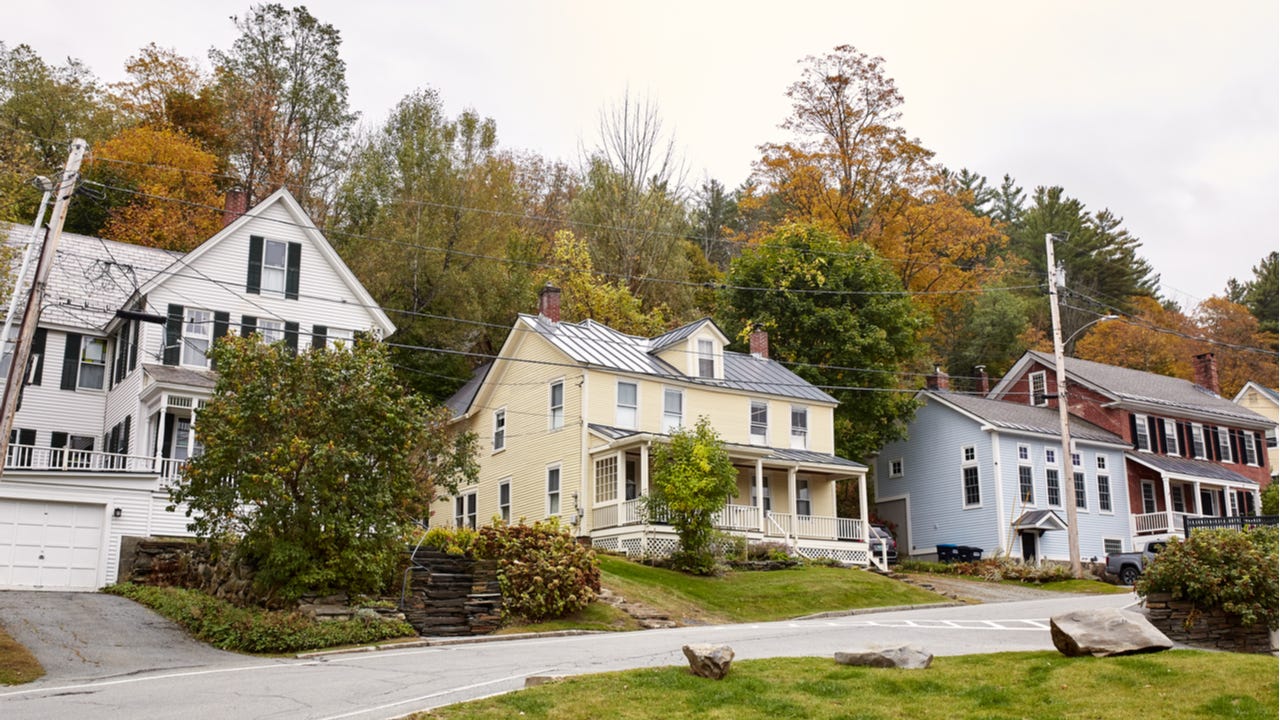Vermont first-time homebuyer assistance programs



Home prices in Vermont are up about 7 percent from last year as of Feb. 2025, according to Redfin. However, the number of homes for sale in the state has increased by nearly 15 percent in the last year.
If you’re a first-time homebuyer in Vermont, the Vermont Housing Finance Agency can help you get the funds you need to make it happen. This state organization is dedicated to promoting affordable housing through mortgage and down payment assistance programs. Here’s a look at some of the options that might be able to help you in your homebuying journey.
-
Median home price, as of Feb. 2025: $388,000 (Redfin)
-
Homes with price drops, as of Feb. 2025: 14.2% (Redfin)
-
Most affordable counties: Caledonia, Essex and Orleans (ATTOM)
Vermont first-time homebuyer programs
VHFA MOVE program
The Vermont Housing Finance Agency’s (VHFA) MOVE program offers the organization’s lowest interest rates. These loans might come with a low down payment requirement between zero and 5 percent of the purchase price, and all can be combined with the agency’s down payment assistance program for even more upfront savings. In addition, you could save up to $1,735 on the Vermont transfer tax.
VHFA Advantage program
If you don’t qualify for MOVE, the VHFA’s Advantage program may be an option. The program offers higher income and purchase price limits — a $140,000 annual earning cap ($170,000 if your household has 3 or more individuals) and a $500,000 maximum sales price, regardless of the county. The requirements are fairly similar to those for the MOVE program.
Vermont down payment assistance and grants
VHFA ASSIST down payment assistance
The ASSIST program through the VHFA offers first-time homebuyers down payment and closing cost assistance of up to $10,000. This assistance, which is a no-interest, no-monthly payment loan, is available to those who qualify for VHFA’s MOVE and Advantage mortgage programs. The loan must be repaid when you sell your home or refinance your first mortgage.
First-Generation Homebuyer Assistance
The VHFA also offers grants of up to $15,000 toward down payment and closing costs for first-generation homebuyers, which the organization defines by meeting one of these conditions:
- You have been placed in foster care at some time in your life.
- Your parents or legal guardians have never owned a home.
- Your parents or legal guardians lost their home due to foreclosure.
The grant money is available on a first-come, first-served basis until it runs out.
City-specific homebuyer assistance programs
Champlain Housing Trust’s shared equity program
Low- and moderate-income borrowers trying to buy in northwest Vermont may be eligible for down payment assistance that covers 20 to 30 percent of the home’s market value. You have to pay the closing costs ($10,000 to $12,000), but the grant covers the down payment and reduces the amount you need to borrow. You don’t need to pay back the funds.
When you sell your house, you must sell it back through the Champlain Housing Trust program, which may limit your profit. If your home’s value increases while you live there, you get 25 percent of the appreciation upon sale.
Other Vermont homebuyer assistance programs
Mortgage credit certificate (MCC)
In Vermont, first-time homebuyers, qualifying veterans and those purchasing in specific target areas are eligible for a mortgage credit certificate (MCC), a tax credit on their mortgage interest equal to up to $2,000 per year. This program is available to all qualifying borrowers, regardless of whether you work with the VHFA to obtain your mortgage.
There are income limits for the MCC, which range from $100,000 to $145,000 depending on your household’s size and what county you live in. There is also a purchase price limit, which ranges from $425,000 to $450,000.
VHFA MOVE MCC
This VHFA program combines the benefits of the MCC with the MOVE mortgage program. With this option, you can get the federal tax credit as well as the advantages of a MOVE loan, including savings on transfer taxes, low down payment options and lower mortgage insurance. This program can also be used in conjunction with the VHFA’s down payment ASSIST program.
Other first-time homebuyer loan programs
While you’re considering the first-time homebuyer programs available specifically for Vermont residents, be sure to explore other national programs that could help you purchase a home. Government-backed programs such as FHA loans, VA loans and USDA loans can be good options for qualifying borrowers with low incomes or less-than-perfect credit scores.
Get started
Now that you have more information on first-time homebuyer programs in Vermont, you’re ready to take the next steps:
- Learn about current mortgage rates in Vermont so you can get the best deals.
- Browse the VHFA’s list of participating mortgage lenders to learn more about which options might be available based on your financial situation.
- Search for your preferred Vermont mortgage lenders and read the reviews.
- Explore your options for homeowners insurance in Vermont.
- Once you’re ready to apply, be sure to sign up for a homebuyer education course to meet that program requirement.
Why we ask for feedback Your feedback helps us improve our content and services. It takes less than a minute to complete.
Your responses are anonymous and will only be used for improving our website.




